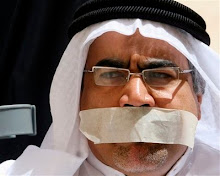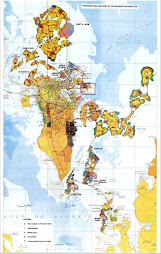HUMAN RIGHTS WATCH
Bahrain: End Threats to Rights Activists
Interior Minister Warned of Criminal Punishment for ‘Foreign’ Contacts
(New York, November 12, 2008) – Bahrain’s government should withdraw a threat by the interior minister to prosecute human rights activists for having met with foreign government officials while abroad, Human Rights Watch said today.
Interior Minister Warned of Criminal Punishment for ‘Foreign’ Contacts
(New York, November 12, 2008) – Bahrain’s government should withdraw a threat by the interior minister to prosecute human rights activists for having met with foreign government officials while abroad, Human Rights Watch said today.
In a statement published by Bahrain’s official news agency on November 5, 2008, the interior minister, Sheikh Rashid bin Abdullah Al Khalifa, threatened Bahraini activists with prosecution for having meetings abroad “for the purpose of discussing internal affairs of the Kingdom of Bahrain in violation of the law,” citing article 134 of Bahrain’s penal code.
“Bahrain points to its membership on the UN Human Rights Council as proof that it’s committed to human rights, then threatens to jail people who exercise them,” said Sarah Leah Whitson, Middle East and North African director at Human Rights Watch. “The kingdom should change laws that violate human rights and stop threatening people who exercise them.”
The November 5 statement did not specify what individuals or groups were involved. But it followed a briefing by members of Bahraini rights groups in Washington, DC, on October 15 to the US Congressional Task Force on International Religious Freedom. Participants, some of whom are also affiliated with opposition political groups, alleged that the country’s Sunni Muslim ruling family systematically discriminates against Bahrain’s Shia majority.
A section of Article 134 of Bahrain’s penal code stipulates that citizens who fail to obtain government permission to attend any meeting abroad or to meet representatives of foreign states, “with the goal of discussing political social and economic conditions in the State of Bahrain or any other state, which could weaken financial confidence in the State of Bahrain or diminish its stature,” may be subject to jail terms of at least three months, fines, or both.
In his statement, the interior minister warned participants in such events against “disseminating information, statements, or rumors that are false or based on an agenda regarding conditions in Bahrain.” He added: “Continued violation of the law with this conduct ... will lead to taking the necessary legal measures to confront these events and the referral of those involved in them for prosecution.”
Bahrain’s constitution enshrines the right of free expression. Article 23 states that “freedom of opinion and scientific research is secured, everyone has the right to express his opinion verbally, in writing or otherwise, in accordance with the terms and conditions prescribed by the law.”
Article 19 of the International Covenant of Civil and Political Rights (ICCPR), to which Bahrain acceded in 2006, states “everyone shall have the right to freedom of expression,” and that “this right shall include freedom to seek, receive and impart information and ideas of all kinds, regardless of frontiers, either orally, in writing or in print, in the form of art, or through any other media of his choice.”
Bahrain, a close US ally, provides the base for the US Navy’s Fifth Fleet – the naval force operating in the Persian Gulf, Red Sea, and Indian Ocean. ¬The country has a predominantly Shia population, although the ruling family is Sunni. The Shia majority claims it is subject to systematic discrimination in housing, state employment, and access to land. Bahrain’s government rejects allegations of religious discrimination.
Bahrain has previously prosecuted activists for making political statements under other elements of its penal code. In 2007, two activists who distributed leaflets calling for a boycott of elections faced charges in a criminal court for disseminating materials that could “harm the public interest.” The two were sentenced on those charges, but subsequently released.
“The government of Bahrain ought to demonstrate its commitment to freedom of expression by revising broad provisions of its laws that can be used to criminalize dissent,” Whitson said.
Related Material
HRW Bahrain country page
Country Page







